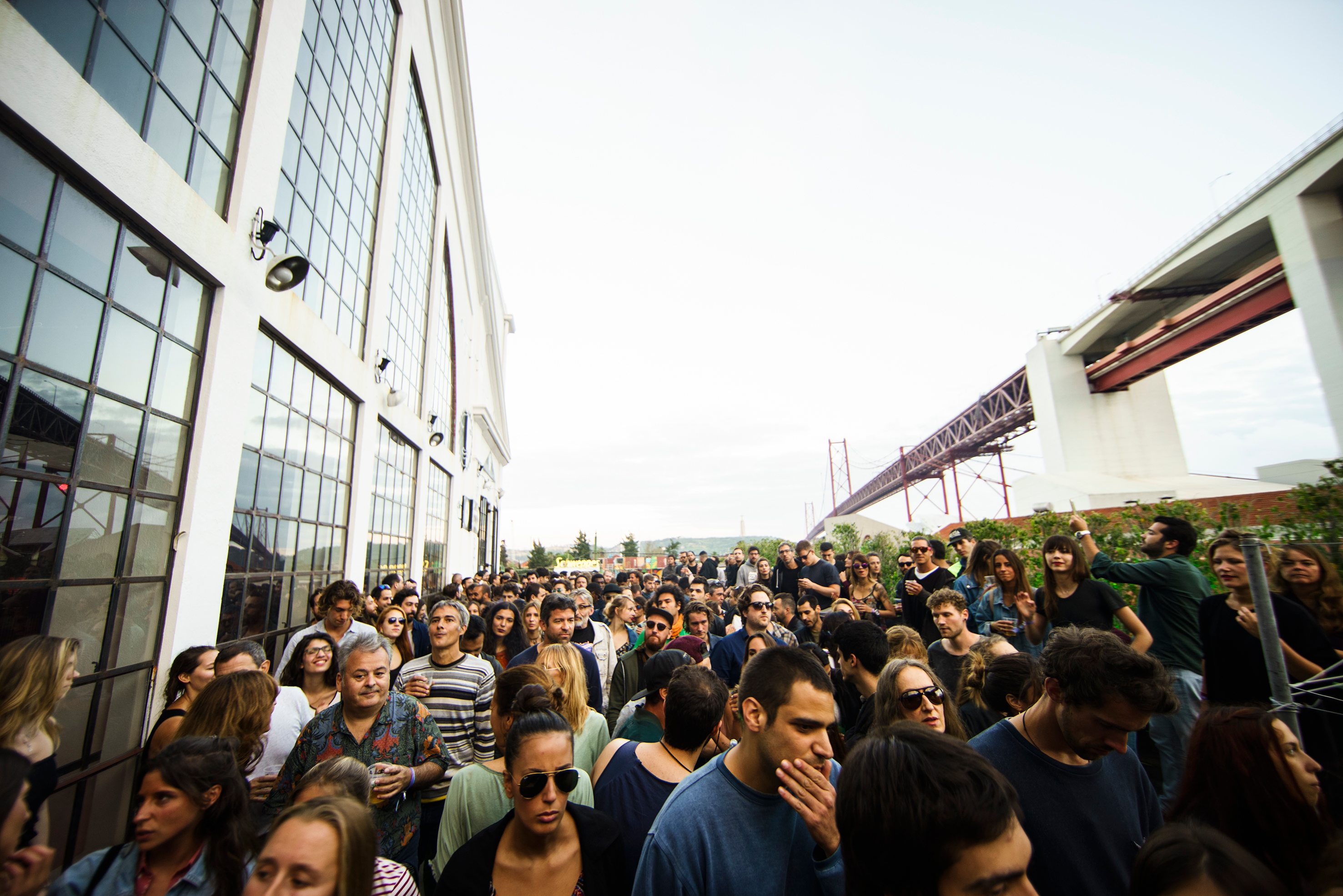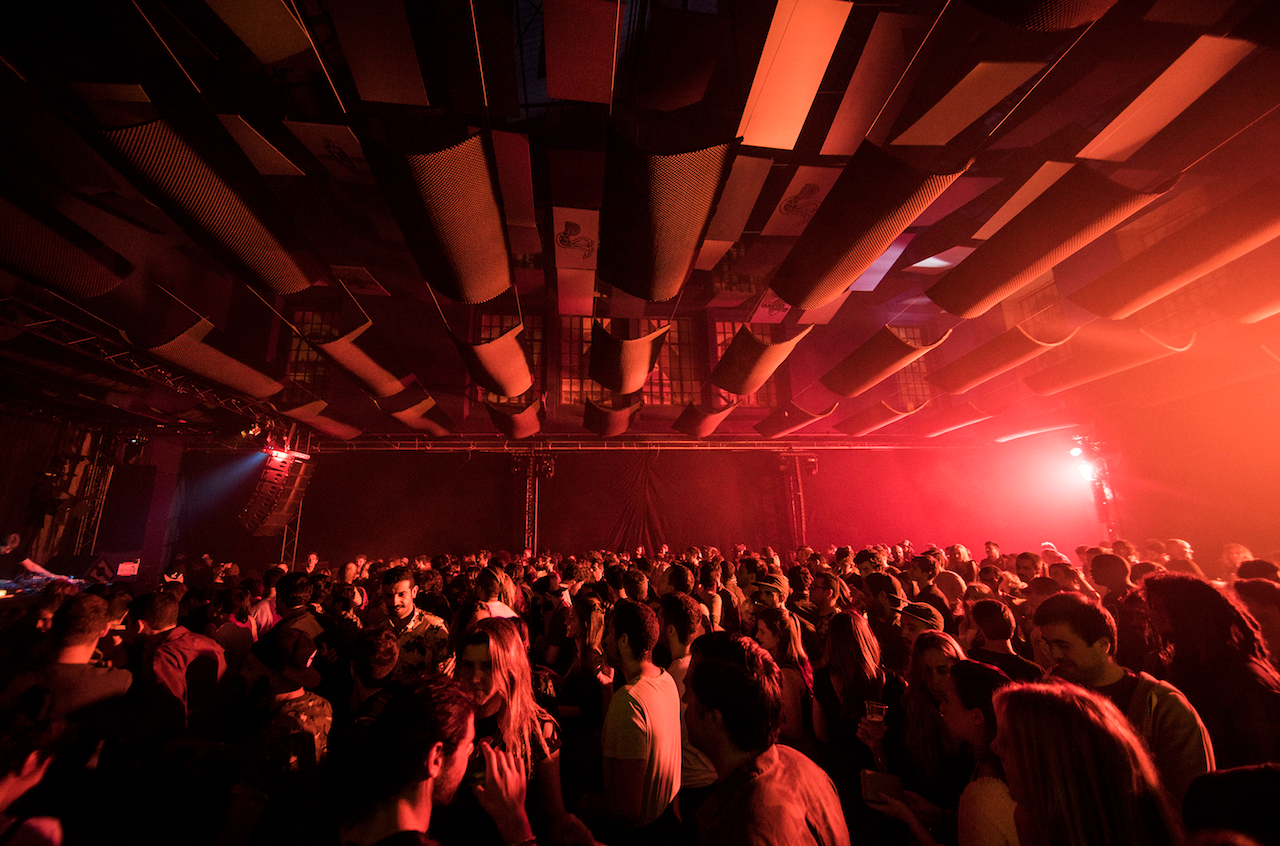- There's a real buzz around Lisbon right now, and it's totally justified. It's got the weather, great food, friendly people and an urban charm that should appeal to everyone—electronic music fans included. The city has a growing number of parties, promoters, musicians and record labels, while clubs like Lux Frágil and Ministerium attract some of the biggest international names. The new Lisboa Electronica festival, which launched last weekend, was keen to expose what the scene has to offer. Around half of the programme was made up of local or Portuguese artists, with the rest cherry picked from all over Europe and the US. These acts were then organised into a series of label showcases, split across four venues at LX Factory, an inner-city complex.
Local troupe Bloop Recordings were the main draw on Friday. DJs Cruz, Kaesar and Magazino brought the sun down on the Open Air stage, playing vibey party hits like Pete Heller's "Big Love" to a crowd decked in dark glasses and sipping cold Carlsberg. It had been raining earlier in the day—an anomaly for Lisbon this time of year—but the evening was warm and the feel-good tunes were a good fit.
House and disco dominated the Portuguese showcases on the main festival site, while the peripheral stuff was set apart in a nearby venue called Zoot. It was only a short stroll around the corner, but the separation seemed to have an impact. Friday at Zoot suffered from poor timekeeping, which left the whole program in disarray (everywhere elsewhere managed to keep to schedule). It meant that when Príncipe stars DJ Marfox and DJ Nigga Fox took to the decks the room was pretty empty. Those who had assembled, though, totally got it.
It felt like Zoot had been given a little less love than the other spaces. The sound wasn't as good and it struggled to draw a crowd all weekend. Even so, I had my festival highlight there during a showcase for Labareda, a label run by Sonja, a cultural activist. It looked like people were just milling around between the acts, but then, suddenly, a black morph suit emerged from the shadows holding a gaming controller and a mic and started screaming into a strobe light. Her partner, meanwhile, unleashed a blitzkrieg of grindcore-gabber-noisey hell. This was Desflorestação, the collaboration between graphic artist Dodo Cabelo (the woman in the morph suit) and electronic multi-instrumentalist krodelabestiole.
Zoot also hosted the second day of the festival's industry conference. The first day went down at Ministerium and opened with a debate on "The current state of electronic music." Mike Huckaby held a production workshop on Friday, which was followed by a lecture from Tresor's charismatic founder Dimitri Hegemann. He played the 2008 documentary SubBerlin: The Story Of Tresor in its entirety and then gave a talk, which I regrettably missed. After 60 minutes of watching revellers in the Berlin techno institution, I was itching to do some raving myself.
Tresor's first showcase took place at Mainstage. Daniel Bell warmed up but unfortunately 9 PM was too early for people and the room was empty. Only a few more gathered for Huckaby afterwards. Next door, local tastemakers Groovement, affiliates of Lisbon record store Carpet & Snares, were set up in the intimate Box—easily the best club space of the weekend. I caught a bit of Titonton in here, working through tough and funky cuts with Cajmere's "Percolator" bumping underneath. I returned to Mainstage around midnight for TR-101, by which time the place was wall-to-wall with punters.
Techno isn't the main sound of Lisbon, which might explain why the organisers chose to import it via showcases from Tresor, Dystopian and Blueprint. But the attendees—mostly locals plus the occasional British stag-doer who had happened across the festival—were very receptive. Even when James Ruskin went in hard, ripping it up on three decks and dropping cranky bangers like Surgeon's remix of his own "Take Control," everyone was going for it. Sigha's intuitive live set was also a highlight—dreamy, but with some bite.
Outside, the graffitied walls, trendy eateries and hipster shops of LX Factory were a reminder of the steep gentrification process Lisbon has experienced in recent years. But Lisboa Electronica wasn't an attempt to cash-in on this. The festival kept its inaugural edition small and fairly clandestine (there was little signage around LX Factory and many stall owners didn't even know it was happening). It paid off: the people who were there had come for the music. The team clearly know their audience and are invested in building something for the long-term.
Photo credit /
Lisboa Electronica | André Leiria
 Tresor's first showcase took place at Mainstage. Daniel Bell warmed up but unfortunately 9 PM was too early for people and the room was empty. Only a few more gathered for Huckaby afterwards. Next door, local tastemakers Groovement, affiliates of Lisbon record store Carpet & Snares, were set up in the intimate Box—easily the best club space of the weekend. I caught a bit of Titonton in here, working through tough and funky cuts with Cajmere's "Percolator" bumping underneath. I returned to Mainstage around midnight for TR-101, by which time the place was wall-to-wall with punters. Techno isn't the main sound of Lisbon, which might explain why the organisers chose to import it via showcases from Tresor, Dystopian and Blueprint. But the attendees—mostly locals plus the occasional British stag-doer who had happened across the festival—were very receptive. Even when James Ruskin went in hard, ripping it up on three decks and dropping cranky bangers like Surgeon's remix of his own "Take Control," everyone was going for it. Sigha's intuitive live set was also a highlight—dreamy, but with some bite. Outside, the graffitied walls, trendy eateries and hipster shops of LX Factory were a reminder of the steep gentrification process Lisbon has experienced in recent years. But Lisboa Electronica wasn't an attempt to cash-in on this. The festival kept its inaugural edition small and fairly clandestine (there was little signage around LX Factory and many stall owners didn't even know it was happening). It paid off: the people who were there had come for the music. The team clearly know their audience and are invested in building something for the long-term. Photo credit / Lisboa Electronica | André Leiria
Tresor's first showcase took place at Mainstage. Daniel Bell warmed up but unfortunately 9 PM was too early for people and the room was empty. Only a few more gathered for Huckaby afterwards. Next door, local tastemakers Groovement, affiliates of Lisbon record store Carpet & Snares, were set up in the intimate Box—easily the best club space of the weekend. I caught a bit of Titonton in here, working through tough and funky cuts with Cajmere's "Percolator" bumping underneath. I returned to Mainstage around midnight for TR-101, by which time the place was wall-to-wall with punters. Techno isn't the main sound of Lisbon, which might explain why the organisers chose to import it via showcases from Tresor, Dystopian and Blueprint. But the attendees—mostly locals plus the occasional British stag-doer who had happened across the festival—were very receptive. Even when James Ruskin went in hard, ripping it up on three decks and dropping cranky bangers like Surgeon's remix of his own "Take Control," everyone was going for it. Sigha's intuitive live set was also a highlight—dreamy, but with some bite. Outside, the graffitied walls, trendy eateries and hipster shops of LX Factory were a reminder of the steep gentrification process Lisbon has experienced in recent years. But Lisboa Electronica wasn't an attempt to cash-in on this. The festival kept its inaugural edition small and fairly clandestine (there was little signage around LX Factory and many stall owners didn't even know it was happening). It paid off: the people who were there had come for the music. The team clearly know their audience and are invested in building something for the long-term. Photo credit / Lisboa Electronica | André Leiria